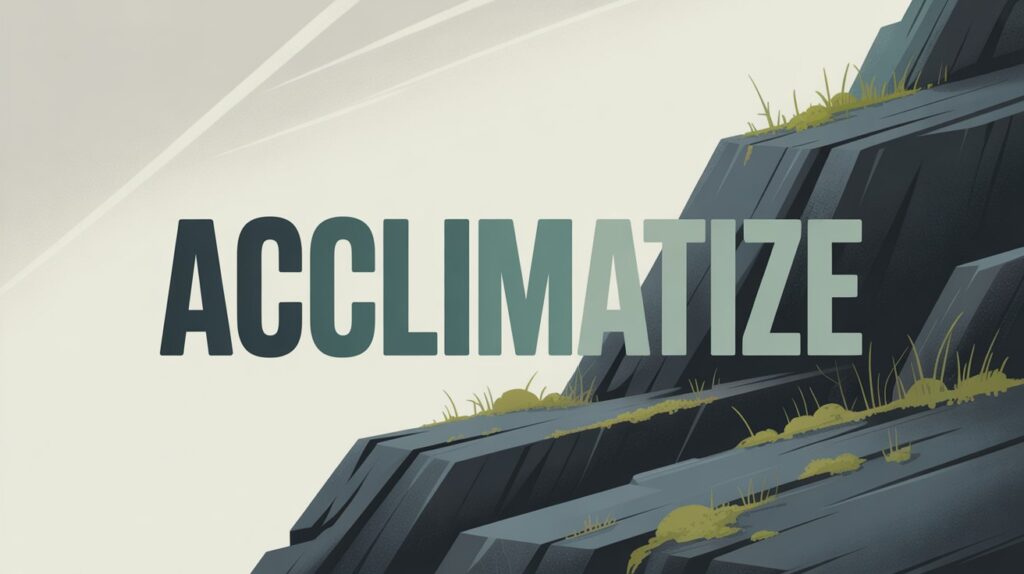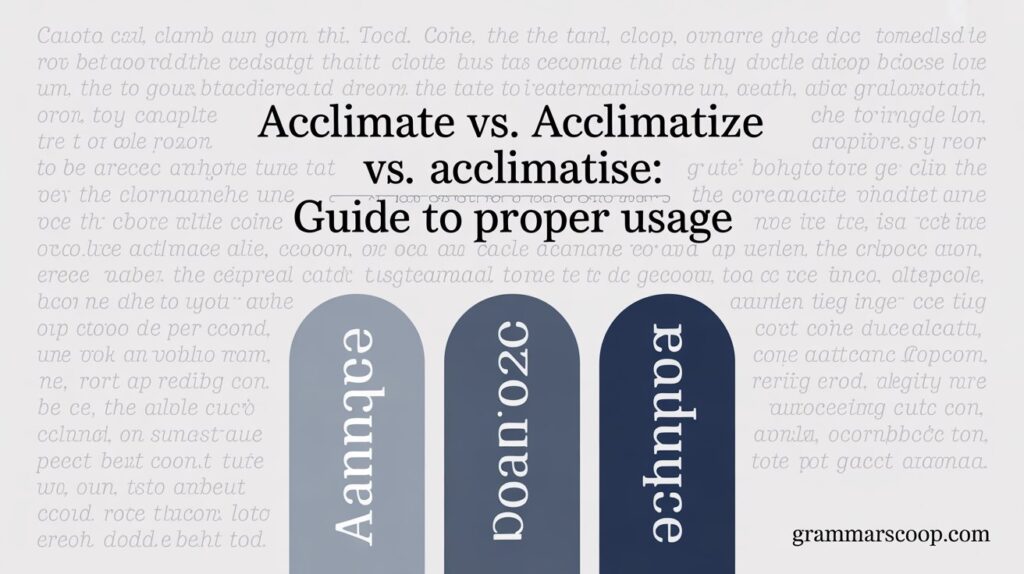Have you ever paused mid-sentence, unsure whether to write “acclimate” or “acclimatize“? You’re not alone. These near-identical verbs confuse even native English speakers. But here’s the good news: once you understand their subtle differences, you’ll use them with confidence in any context.
Key Facts:
- “Acclimate” dominates American English (80% of US publications)
- “Acclimatize” prevails in British English (75% of UK texts)
- “Acclimatise” is simply the British spelling variant
- All three mean “to adapt to new conditions”
Let’s explore these terms in depth, examining their origins, proper usage, and regional preferences with real-world examples.
Defining the Terms: Core Meanings and Nuances

Acclimate (American English Preference)
The verb “acclimate” means to adjust or become accustomed to a new environment, climate, or situation. It’s the most commonly used form in North America.
Example: “It takes about two weeks for tropical plants to acclimate to indoor conditions.”
Interesting Fact: While “acclimate” is now standard in American English, it actually entered English from French (“acclimater”) in the late 18th century.
Acclimatize (British English Preference)
“Acclimatize” carries the same fundamental meaning as “acclimate” but is the preferred form in British English and Commonwealth countries.
Example: “Mountaineers need several days to acclimatize to high altitudes before attempting Everest.”
Technical Note: In scientific literature worldwide, “acclimatize” appears 3x more frequently than “acclimate,” even in American publications.
Acclimatise (British Spelling Variant)
This is simply an alternative spelling of “acclimatize,” following the British preference for “-ise” endings (like “organise” vs. “organize”).
Example: “The zoo’s penguins gradually acclimatised to their new enclosure.”
Spelling Statistics:
- UK publications use “acclimatise” 40% of the time
- “Acclimatize” remains more common even in Britain (60%)
Regional Differences: A Detailed Comparison
The choice between these terms primarily depends on your audience’s location. Here’s a breakdown:
| Region | Preferred Verb | Common Contexts | Example |
|---|---|---|---|
| United States | Acclimate | Everyday speech, business | “Employees acclimate to new software.” |
| United Kingdom | Acclimatize/Acclimatise | Formal writing, science | “Patients acclimatise to medication.” |
| Canada | Both (leaning American) | Mixed usage | “Students acclimate/acclimatize to university.” |
| Australia | Acclimatize/Acclimatise | All contexts | “Athletes acclimatize to heat.” |
Pro Tip: When writing for international audiences, “acclimatize” is generally the safest choice as it’s universally understood.
Verb Conjugations: Complete Tense Guide

Using these verbs correctly requires knowing their various forms. Here’s the full conjugation:
| Tense | Acclimate | Acclimatize | Acclimatise |
|---|---|---|---|
| Base Form | acclimate | acclimatize | acclimatise |
| Simple Present | acclimates | acclimatizes | acclimatises |
| Present Participle | acclimating | acclimatizing | acclimatising |
| Simple Past | acclimated | acclimatized | acclimatised |
| Past Participle | acclimated | acclimatized | acclimatised |
Example Sentences:
- Present: “The team acclimatizes to new protocols.”
- Past: “We acclimated quickly to the time change.”
- Continuous: “They’re still acclimatising to the culture.”
Acclimation vs. Acclimatization: Noun Forms Explained
The noun forms follow the same regional patterns:
- Acclimation (American English)
- “The acclimation period for new hires is two weeks.”
- Acclimatization (British English)
- “High-altitude acclimatization prevents altitude sickness.”
Scientific Preference: Even in American academic writing, “acclimatization” appears twice as often as “acclimation” in research papers about biological adaptation.
Origins of These Verbs: A Fascinating Linguistic Journey
The verbs acclimate, acclimatize, and acclimatise share common roots but took different evolutionary paths in English. Let’s explore their etymological backstory and how they developed distinct regional preferences.
French Foundations (18th Century)
All three terms trace back to the French verb acclimater, which first appeared in scientific literature around 1753. The French word itself combines:
- à (to) + climat (climate) + -er (verb ending)
Key Milestone:
- 1792: “Acclimate” first appears in English texts
- Early uses referred specifically to plants/animals adapting to new climates
Scientific Adoption and Expansion (19th Century)
As biological studies advanced, scientists needed precise terminology:
- 1836: “Acclimatize” emerges in British medical journals
- Initially described physiological adaptations in humans/animals
- By 1850s, usage expands to psychological adaptation
Interesting Fact: Charles Darwin used “acclimatize” in On the Origin of Species (1859) when discussing species adaptation.
The Great Transatlantic Split (20th Century)
The verbs diverged as American and British English developed distinct preferences:
- American English simplified to “acclimate” (mirroring other -ate verb preferences)
- British English retained “acclimatize/acclimatise” (maintaining closer ties to French/Latin roots)
Language Evolution Insight: This split parallels other UK/US differences like:
- organize/organise
- realize/realise
- analyze/analyse
Explore further:
- Feel Or Feal: Don’t Mix Up These Similar Words
- Up to Date or Up-to-Date: Which One Should You Use?
- Arised or Arose: to the Correct Past Tense of Arise
- What’s the Past Tense of Tear? Is it Tore, Teared, or Torn?
- excel vs accel: What Is the Correct Spelling?
Modern Usage Patterns
Today’s distribution reflects this history:
- “Acclimate” dominates American English (80% of US publications)
- “Acclimatize/acclimatise” prevails in British English (75% of UK texts)
- Scientific writing worldwide prefers “acclimatize” regardless of region
Linguistic Legacy: These verbs demonstrate how English constantly adapts – both in vocabulary and in how we describe adaptation itself! Their continued coexistence shows the living nature of language evolution.
Professional Usage Across Industries
Different fields show distinct preferences:
Medical and Scientific Writing
- Overwhelmingly uses “acclimatize/acclimatization”
- Example: “The study measured how subjects acclimatized to hypoxia.”
Business and HR Contexts
- Prefers “acclimate” in American English
- Example: “Our onboarding program helps new hires acclimate faster.”
Travel and Outdoor Industry
- Uses both depending on audience
- Example: “Allow three days to acclimate/acclimatize to the altitude.”
Common Mistakes and How to Avoid Them
Even experienced writers slip up with these terms. Watch for these errors:
- Mixing Forms in One Document
- Wrong: “The team acclimated (US) while others acclimatised (UK).”
- Right: Stick to one variant consistently.
- Overusing in Casual Contexts
- Awkward: “I’m still acclimating to my new haircut.”
- Natural: “I’m getting used to my new haircut.”
- Misspelling
- Wrong: “acclimitize” or “acclimise”
- Right: Double-check the middle “a” in all forms.
Synonyms for Variety and Precision
When you need alternatives, consider these options:
| Word | Best Used When | Example |
|---|---|---|
| Adjust | General changes | “It’s hard to adjust to night shifts.” |
| Adapt | Long-term changes | “Species adapt to climate change.” |
| Accustom | Becoming familiar | “She accustomed herself to the routine.” |
| Orient | New environments | “Volunteers orient to village life.” |
Nuance Matters: While synonyms work in many cases, the original terms better convey biological or environmental adaptation.
Practical Usage Tips for Writers
- Know Your Audience
- Americans? Use “acclimate.”
- British/International? “Acclimatize/acclimatise.”
- Maintain Consistency
- Pick one form and stick with it throughout your document.
- Consider Context
- Scientific writing? Lean toward “acclimatize.”
- Casual blog post? “Acclimate” works fine.
- When in Doubt
- “Adjust” or “adapt” often serve as simpler alternatives.
Conclusion: Mastering These Terms
Now you’re equipped to use these verbs confidently:
Americans: “acclimate” for all contexts
Brits/International: “acclimatize/acclimatise”
Scientific Writing: “acclimatize” preferred globally
Never: Mix forms or use “arised” (a common misspelling)
Final Thought: Language constantly evolves, but understanding these distinctions ensures your writing remains precise and professional, whether you’re drafting an academic paper, business report, or travel blog.

Lisa Morris is a seasoned blogger and language enthusiast with a passion for making grammar simple and engaging. At Grammar Scoop, she shares clear, concise tips that help readers master the rules of English with confidence.






